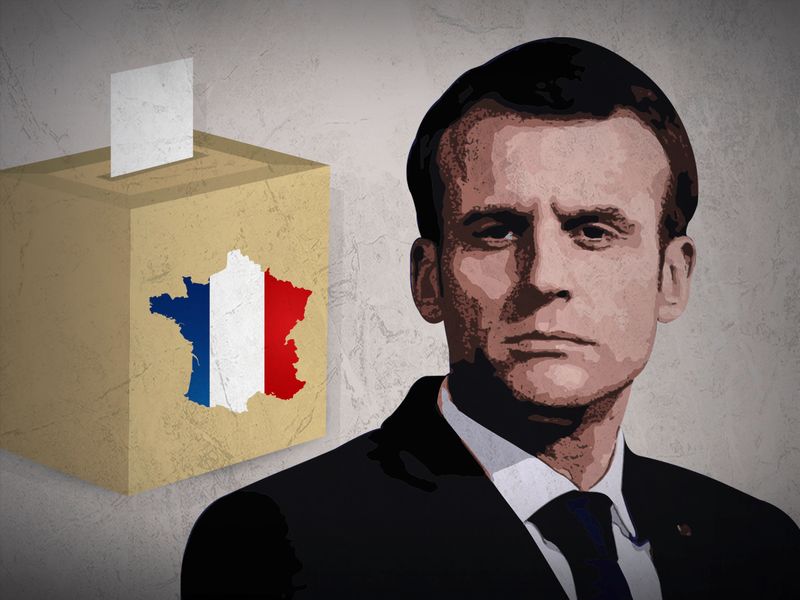
If you live in the UAE in June, you will be well used, if indeed you ever can, to average temperatures that stick at 40 degrees Celsius and above.
Not in Germany, France and Spain, where temperatures in what are still meteorological terms springtime clocked 43 degrees in some places.
The mercury rocketed because of a pairing of two separate climatic events — a heat plum off the Sahara and a low pressure system off Europe’s western coast, channelling hot air up across Spain, then France into Germany. And yes, the heat brought wildfires and poor air quality.
In Berlin, the city’s lakes were filled with swimmers, in stylish Biarritz where France takes a sharp turn into Spain, there was little relief from the 42-degree heat. Parks in Paris remained open overnight to try and offer some relief.
So yes, it was simply too hot to have to vote. Heat fatigue is one thing, political fatigue another, with the French facing their fourth round of voting in two months — two rounds of the presidential election, and two rounds of National Assembly elections concluding right as the temperature spiked. Small wonder that less than half of some 48.5 million French voters were able to make it to sweltering polling stations. Young voters in particular, shunned the booths for the sun instead.

With that type of turnout, is it really any wonder that those who did vote would be those determined to make a point one way or another. And anywhere in any election, a low turnout is never good for any incumbent — and for Marcon the news wasn’t good. His Ensemble alliance lost its absolute majority in the French parliament, just two months after he was re-elected as president.
When the ballots were counted, Macron’s candidates won 245 seats, ahead of the left-wing coalition Nouvelle Union Populaire Ecologique et Sociale (NUPES) with 131 and the far-right National Rally which made a historic breakthrough with 89 seats.
As things stand following the vote, Macron’s Ensemble remains 44 deputies short of an elusive 289 majority.
If there is a silver lining in this cloud for the French president, it is that neither the left nor the right are capable of forming a government on their own either.
If anything, the result shows just how volatile French politics has become — with Marcon popular, just not popular enough. Sure, if left and right combined, they could form a government — but the chances of that happening is about as much as a snowball in Biarritz last week.
For now, a chastened Macron is holding talks with party leaders to try and find a way forward to form a working government. Some of his allies have advocated a grand coalition or a government of national unity. Right now, that seems a step too far for a president who might not have won the National Assembly elections — but he certainly didn’t lose them either.
His Ensemble group is still the largest, making it all the more likely that he will seek out support from a smaller party with the lure of a meaningful seat at the table.
Hostile groups on the left and right mean he somehow has to convince more centrist opponents that there’s political capital to be made by supporting his push for important reforms — including on pensions, tax cuts and raising the retirement age — all of which will be nearly impossible to do without a coalition partner.
“We will have to show a lot of imagination” to govern, admitted economy minister Bruno Le Maire.
Hard-left veteran and erstwhile presidential candidate Jean-Luc Lelenchon, who didn’t run in the National Assembly elections, is basking in his newfound role of opposition leader, replacing Marine Le Pen and her far-right National Rally party. Perhaps, after three successive second-round presidential losses, voters are a little fatigued by her too. Heading into the first round of presidential voting in April, the left seemed like a spent force, with Macron facing his stiffest competition for Le Pen and the even more hard-line Eric Zemmour
Melenchon labelled the National Assembly results “the electoral failure of Macron,” adding the results were “a total rout of the presidential party”. Not quite.
Although Melenchon will most likely have to give up on his ambition of being prime minister, with 141 seats, NUPES, which gathered the likes of Communists and Greens under its banner, is far more diverse and powerful than the 17 seats Melenchon managed to secure in 2017.
A new reality
After the rhetoric on Sunday night as the results poured in, there was a new reality for him too. His call on Monday for his alliance to form one parliamentary group immediately ran into trouble, with the Socialists, Greens and Communists all rejecting the idea.
He might have created an alliance capable of damaging Macron at the polls, but it is also sufficiently weak to allow Marcon an opportunity to find compromise. So too the Republican party who are to the right of the spectrum — but also ideologically lithe enough to understand the reality of a partnership, ad hoc or otherwise, with Ensemble.
The Republicans, who once were the dominant force in French politics under the likes of Jacques Chirac and Nicolas Sarkozy, ended up with just 7 per cent of the votes. Their 61 deputies seem crucial to the political fortunes of Marcon, and there is already a debate within the party on how Macron’s lack of an overall majority could amplify their influence in parliament.
As a result of the vote, Prime Minister Elisabeth Borne offered her resignation on Tuesday — as a number of party leaders had demanded — but this was refused by Macron whose office said there was a need for her to assure the government’s day-to-day operation for now. She has only been in office since Macron was returned to the Elysee Palace on 24 April.







